“Mobilizing Faith Communities,” Panel at the Alliance of Baptists Gathering
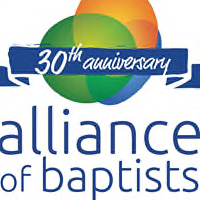 Among the inspiring presentations at the Alliance of Baptists Gathering was “Mobilizing Faith Communities,” led by panelists Rev. Dr. William J. Barber, president of Repairers of the Breach and pastor of Greenleaf Christian Church, Goldsboro, North Carolina; Rev. Dr. Nancy E. Petty, board chair of Repairers of the Breach and pastor of Pullen Memorial Baptist Church, Raleigh, North Carolina; Rev. Aundreia Alexander, Esq., Associate General Secretary for Action and Advocacy, National Council of Churches; and Rev. Benjamin Boswell, pastor of Myers Park Baptist Church, Charlotte, North Carolina. Their wise words provided guidance for social justice activism. I found their practical suggestions applicable to our local social justice advocacy organization, initiated by Rev. Dr. Isabel Docampo and Dr. Hind Jarrah: FOCUS-DFW (Faith. Organizing. Community. Unity. Solidarity – Dallas Fort Worth).
Among the inspiring presentations at the Alliance of Baptists Gathering was “Mobilizing Faith Communities,” led by panelists Rev. Dr. William J. Barber, president of Repairers of the Breach and pastor of Greenleaf Christian Church, Goldsboro, North Carolina; Rev. Dr. Nancy E. Petty, board chair of Repairers of the Breach and pastor of Pullen Memorial Baptist Church, Raleigh, North Carolina; Rev. Aundreia Alexander, Esq., Associate General Secretary for Action and Advocacy, National Council of Churches; and Rev. Benjamin Boswell, pastor of Myers Park Baptist Church, Charlotte, North Carolina. Their wise words provided guidance for social justice activism. I found their practical suggestions applicable to our local social justice advocacy organization, initiated by Rev. Dr. Isabel Docampo and Dr. Hind Jarrah: FOCUS-DFW (Faith. Organizing. Community. Unity. Solidarity – Dallas Fort Worth).
The panel at the Alliance Gathering gave us a helpful handout with steps for mobilizing in the streets, at the polls, and in the courtrooms.
- Engage in local grassroots organizing, and connect with others across the state.
- Use moral language to frame and critique public policy, regardless of who is in power.
- Demonstrate commitment to civil disobedience that follows the steps of nonviolent action and is designed to change the public conversation and consciousness.
- Build a stage from which to lift the voices of everyday people impacted by immoral policies.
- Recognize the intersection of racism, classism, sexism, and other injustices.
- Build a broad, diverse coalition including moral and religious leaders of all faiths.
- Diversify movements with the goal of winning unlikely allies.
- Build transformative, long-term coalition relationships rooted in clear agendas that do not measure success only by electoral outcomes.
- Make a serious commitment to academic and empirical analysis of policy.
- Coordinate use of all forms of social media: video, text, Twitter, Facebook, etc.
- Engage in voter registration and education.
- Pursue a strong legal strategy.
- Engage the cultural arts; moral movements are as strong as the songs we sing and the stories we tell.
- Resist the “one moment” mentality and work toward building a movement.
(steps outlined by Repairers of the Breach and published in The Third Reconstruction: How a Moral Movement is Overcoming the Politics of Division and Fear, by William J. Barber.)

In the panel discussion Rev. William Barber responded to a question about healthcare, pointing out that healing is a central focus of Scripture. He talked about the hypocrisy of members of Congress having healthcare but working to deny it to others. “I believe that healthcare is a human right, a part of our faith tradition,” he said. “It’s sinister to deny people healthcare because people are dying without it. The same states that deny healthcare also deny living wages, suppress voter rights, deny gender rights, and pass some of the most unjust immigration laws.” Rev. Barber compared some elected officials to the leaders condemned in the Bible who became “like ravenous wolves who kill and devour the poor” (Ezekiel 22:27).
Over and over Rev. Barber challenged us to claim moral authority, to preach good news for the poor (Luke 4:18). He emphasized using moral language: right or wrong, not right or left, not Democrat or Republican. “Healthcare, budgets, public education, immigration—these are moral issues, not just public policy issues,” he said. He called for a national revival campaign for poor people, challenging racism, sexism, militarism, and poverty.
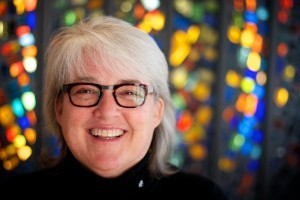
Rev. Nancy Petty called for non-judgmental respect for people who feel called to play different parts from ours in advocating for social justice. “We need people working for change on the outside and on the inside of institutions,” she said. “No one can play all parts. That’s why we have to work in community. Our part may be as activists out on the streets, maybe even getting arrested. Others may find their places sitting at the table to negotiate. I realized when I got arrested one time, I had lost my place at the negotiating table. I learned not to pass judgment on people who play different roles in the movement.”
Rev. Petty encouraged us to ask questions about where we can start with our congregations. She commented on ways clergy and laypeople can work together to build the narrative in our faith communities that social justice action is what we’re all supposed to do, not just what some “liberal” congregations do. Building this narrative takes trust and intentionality. It involves taking risks together. Working for change takes asking questions, listening to fears, and challenging fears in relationships.
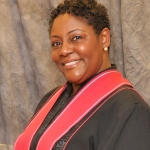
Drawing from her work with the National Council of Churches, Rev. Aundreia Alexander challenged us to form coalitions to work on the national level. She emphasized that movement work happens at the local, state, county, and national levels. “We have a national president, a national attorney general, and other national officials setting policies that affect states and communities,” she said. “Yes, there are state laws, but those guidelines come from the national level.”
Rev. Alexander called us to find ways to work together nationally. State interfaith councils, state councils of churches, and other state organizations coming together to work at the national level have power to bring change. She gave an example of 150 pastors in Iowa joining to advocate for change on the national level. “We need ways to connect and communicate, to move at home and then on to the national level,” she said. “We can wield power from local and state levels to the national. One of our roles in society is to serve as a moral compass within the public square, and to call our leaders to account when they act in ways that are unfair or are self-serving. Christian leaders have a responsibility to care for the holistic needs of the community as well as to speak truth to power and hold the 3 branches of government accountable.”
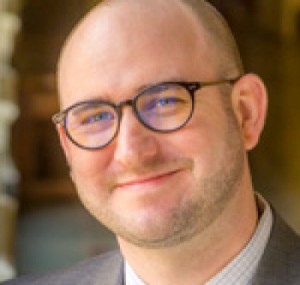
Rev. Benjamin Boswell spoke about the struggles he and other white clergy have in trying to organize to build power for social action. A pastor of a large, wealthy church told him, “If it’s about power, I’m out and my people are out, because Jesus didn’t talk about power.” Rev. Boswell commented that the reason these pastors don’t have to think about power is that they have it. “There is a deep theological misunderstanding about the Bible, about theology, and about what the church is supposed to be doing. It’s not true that Jesus doesn’t care about power. If we’re not willing to talk about power in white churches that have power, we’re not going to be able to participate in the movement.”
Rev. Boswell talked about how fear and distrust keep pastors from working for social justice. “A spirit of fear is keeping white wealthy churches from getting involved in the movement,” he said. “We have to get over that fear. There is also so much distrust—between blacks and whites, between whites and whites. When we’re doing organizing, we have to trust each other.”
The Alliance Gathering provided an opportunity to act on the challenges to mobilize for social justice.

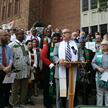 Press Conference and Protest at Alliance Gathering in Raleigh
Press Conference and Protest at Alliance Gathering in Raleigh